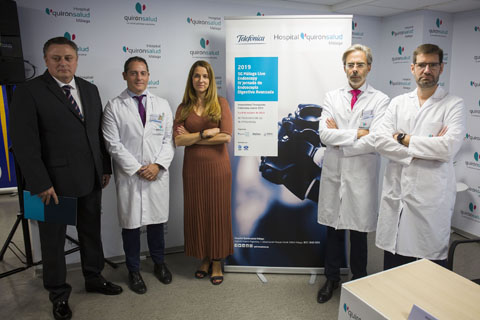Telefónica presents the first system of expert remote assistance to surgeries based on 5G and the integration of medical data through augmented reality
Madrid, 3 October 2019 - The Quirónsalud Málaga Hospital in Spain and Telefónica today presented the first expert assistance system for medical interventions with integrated 5G technology and Augmented Reality (AR) as part of the IV Advanced Digestive Endoscopy Conference.
The gathering becomes the first medical congress in the world in which the training medical sessions have been broadcast live with almost no latency and enabling doctors and attendees to interact thanks to 5G technology and AR.
The groundbreaking nature of this year’s edition consists in the performance of seven digestive endoscopy surgeries with 5G technology and augmented reality by two world leaders in endoscopy. Dr Pedro Rosón Rodríguez, Head of the Digestive System Service of the Quirónsalud Málaga Hospital, who conducted the surgery from the Endoscopy Room at Quirónsalud Málaga, had the supervision and advice from Japan of Dr Katsumi Yamamoto, director of the Endoscopy Centre of Osaka Hospital.
Mercedes Fernández, Innovation Manager at Telefónica, points out, "the operations organised at this conference are just an example of the numerous practical applications that 5G can have in healthcare. Thanks to two key features of this technology – the low latency that allows transmission without delays and the ability to handle large video streams at high speed – it was possible to perform this intervention with the added value of doing so live and in real time with the interaction of doctors and attendees to provide solutions and ask questions about the clinical case that was undertaken”
"The experience of previous years in organising innovative training courses in digestive endoscopy allows us this year to provide a global training course thanks to 5G technology, something that might seem science fiction but that we are making reality today” says Dr Pedro Rosón. “The use of 5G and augmented reality is, without doubt, what stands out in comparison with our previous editions and with any other standard medical workshops. We are therefore proud to keep and to continue offering an innovative training space with the live conducting of cases by specialists from Spain and abroad, with an emphasis on theory and reviewing the latest advances in interventional endoscopy".
The 5G technology provided by Telefónica has been key for two reasons. On the one hand, the capability it offers in transmitting 4K quality videos of endoscopy systems at high speed. On the other, for the minimising of delays thanks to the low latency of 5G that enabled tutoring from Japan and also enabled the 100 doctors and attendees to interact with the operation that Dr Rosón was conducting.
The videoconference used WebRTC and HTML5 technology meaning that only a web browser is required for the operation. This solution has been made possible thanks to the collaboration of the Málaga-based company, Linos Soluciones Informáticas S.L, specialising in the development of web solutions, Artificial Intelligence and Augmented Reality.
In addition, the augmented reality has been incorporated as a new development in the videoconference screen, where essential information was displayed throughout the entire operation as it was updated in real time. Specifically, these were endoscopic parameters (type of scalpel and power of the electric and suture scalpel) and vital parameters such as blood pressure and heart rate.
The augmented reality also enabled interaction from Japan and from the same attendees who were able to indicate graphically on the screen the parts through which it was suggested how the surgery should proceed.
Following this operation, there are plans to conduct a similar one using once again Telefónica's 5G technology. This time Dr Pedro Rosón will advise directly on an operation to be carried out on a patient at the Poniente Hospital in El Ejido (Almería), a centre run by the Andalusian health service and carried out by Dr Francisco Gallego, head of the Endoscopy service at this hospital.
Both initiatives represent a a major step forward in the real use cases of 5G, this time in the field of healthcare. Work continues together with Huawei in Málaga as one of the Spanish technological cities chosen by Telefónica to develop its 5G Technology Cities project.
Email Newsletters
Sign up to receive TelecomTV's top news and videos, plus exclusive subscriber-only content direct to your inbox.



